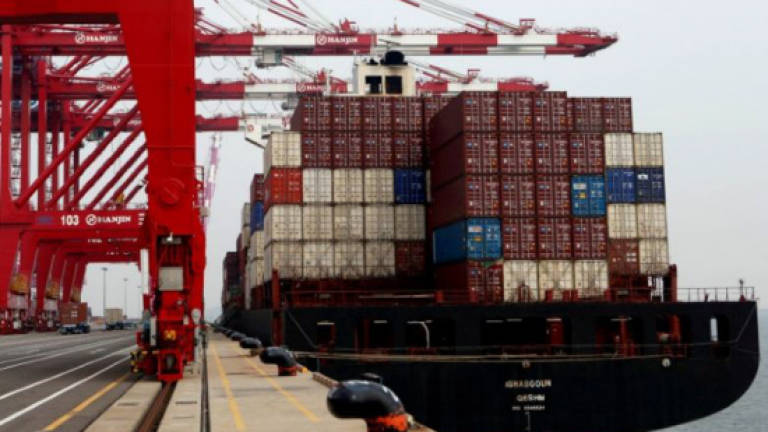Pressing need to improve logistics, cargo processes at Malaysian ports

KUALA LUMPUR: There is a pressing need to further improve logistics and cargo processes because any delay could risk Malaysian ports losing to its regional competitors.
Federation of Malaysian Freight Forwarders President Chua Seng Wah said the delay in processes in cargo businesses had affected the country's logistics performance, with Malaysian ports losing out to regional ports due to the lack of uniformity in terms of enforcement at the Free Commercial Zones (FCZ).
He said Malaysia's position slipped in the ranking of 160 countries to 32nd position in the World Bank's Logistics Performance Index (LPI) 2016 from 25th in 2014.
The LPI measures country performance every two years and the decline was attributed to the drop in six components of the index.
The obvious decline was seen in the competitively priced international shipments' category, which saw Malaysia falling to 32nd position from 10th in 2014; shipments timeliness to 47th in 2016 (2014:31); and Customs and border clearance efficiency in 40th in 2016 (2014:27).
"The country's logistics performance has dropped and is still dropping, and this is due to the deficiency in enforcement activities which delay all the processes in the cargo business, especially in the FCZ areas.
"Hence, most companies turned back to Singapore. They don't mind paying extra although Malaysia has cheaper rates, and Malaysian ports, as well as free commercial zones, offer sufficient facilities and infrastructure," he told Bernama in an interview.
Regionally, Singapore was ranked 5th in the LPI, scoring 4.14 points versus Malaysia's 3.43.
"While Malaysian port operators are facing hurdles in the business, Singapore is expanding terminals at Port of Pasir Panjang, on top of their mega plan for Tuas," he said.
Chua stressed that transhipment activities had also declined between 10% to 15% over the years and the trend was continuing.
"We (Malaysia) used to be the hub for cargo consolidation for Asean. We used to do up to 10,000 containers for transhipment, export and re-export activities a month but now the number declined by about 30% from what previously being carried due to failings in enforcement," he added.
He said these cargo owners would need permits and permission under Section 75(C) of the Customs Act 1967 for cargoes involving re-export activities and LCL (less than container load) transhipment.
Chua pointed out that blaming freight forwarders was not the right way, as enforcement measures across the board had delayed import and export processes; especially when freight forwarders handling cargo in and out, had exercised due diligence.
Commenting on the transformation in the global shipping alliances last year, with carrier competition shrinks all the way down to three alliances – THE Alliance, 2M and Ocean Alliance, Chua said this had benefited freight forwarders as the shipping rates went up, translating it into higher commissions.
These three alliances represent 77.2% of global container capacity and a whopping 96% of all East-West trades.
"Merging doesn't affect us. In fact, it makes us better. As they merge, prices go up and as our revenue is based on margins, which means the higher the rate the higher the margin we receive.
"As freight forwarders, we become the Principal of the freight booking on behalf of customers to the shipping liners and it is worth to note that 60% of the sea trade is controlled by freight forwarders," Chua said.
He said however, the government should consider the expansion of much-needed port facilities to Carey Island through joint-ventures with shipping lines and investors to ensure direct ship calls and cargo volume.
"Port Klang's volume consists of about 70% of transhipment boxes, of which Chua believes high rebates given to the shipping companies.
"Ironically, they are being subsidised by indigenous cargo, of which 90% of the cargo are by small and medium enterprise (SME) shippers," he said.
Many shipping lines berthing at Malaysian ports are multinational in nature and the world's largest container shipping companies, such as CMA-CGM and Hapag Lloyd.
Chua said with global networking and advanced technology, small and medium freight forwarders were capable of offering the same service as FedEx and Ups, but bigger companies won bigger contracts.
"We SMEs can also send small parcels to big cargoes, and in fact, SMEs give better service compared with multinational companies (MNCs), not to mention they would usually work with them.
"We have better speed when compared to big companies because when these shipping liners merged, they would opt for automated operations, sync their offerings and they don't have salesperson anymore.
"This is when we play our role to help the customers because not all of our customers can do that booking," he said.
The logistics sector is a critical service provider to the export and import industries and according to the Logistics Council of Malaysia as logistics accounted for some 14% of the country's gross domestic product or RM238 billion last year. — Bernama